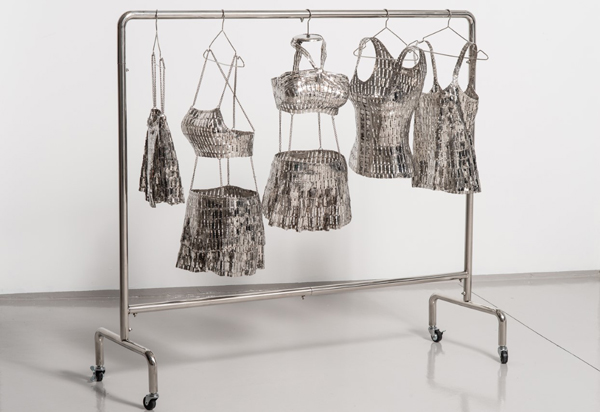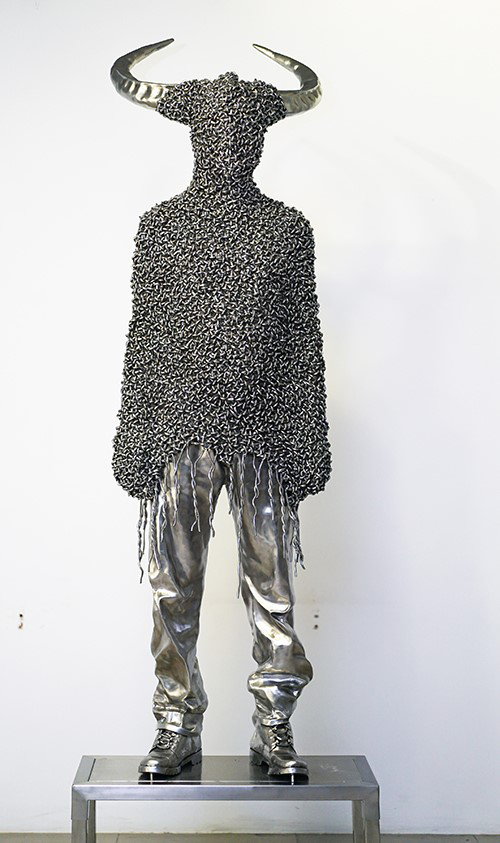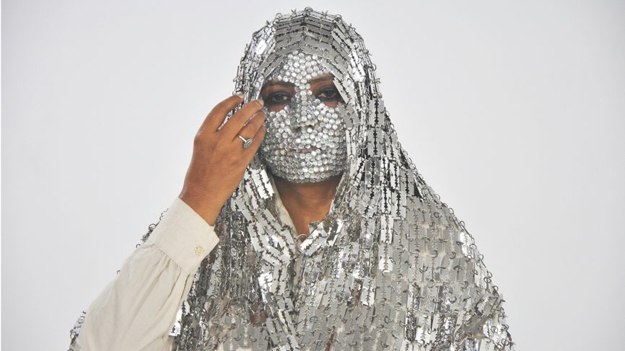Tayeba Begum Lipi & Mahbubur Rahman
Colette Copeland
June 2020
The ninth and final conversation with artist couples delving into
how they are surviving the pandemic times.
 Tayeba Begum Lipi, The Rack I Remember 2019, stainless steel (razor blades), 60 x 18 x 53 cms
Tayeba Begum Lipi, The Rack I Remember 2019, stainless steel (razor blades), 60 x 18 x 53 cms
Email conversation with Tayeba Begum Lipi & Mahbubur Rahman
CC: How has covid19 and the quarantine impacted your artistic practice both conceptually and technically?
TBL: It was difficult to accept the situation in the beginning. Suddenly, I felt that the entire world was immobilised with all future planning, commitments, and activities either postponed or cancelled. Watching the news channels, we became scared to touch anything, not even trusting our closest associates such as our work assistants, fabricators, friends and family, which was frustrating. We shut down our studios and asked our associates to take leave and stay at home.
After a few days, we limited TV and social media and began working in the first floor studio next door. Just as precaution, we even stopped using our ground floor studio space, since one of our assistants lives next door with his family. We were worried about their newborn son’s safety and health.
I decided to focus on creating a completely different kind of work, stitching or embroidering on some special painted cloth I bought from a handmade paper Industry in Kathmandu last February. I used to embroider and make my own clothes. Unfortunately, my busy schedule over the years does not allow me much time for cloth/textile work. The lockdown has given the entire world a chance to slow down, thus providing me with the time to produce at least 6 time-consuming works. I think it is time to do things that have not been done before.
Apart from my personal practice, Mahbub and I both were thinking about engaging other artists in a project about overcoming the depressed mental state that everyone has been going through. Under Britto Arts Trust, the non-profit artists’ collective that we both are associated with since inception, we are undertaking a project titled “Zero Waste- Food Art.” This is an open platform- any artist or art organization can join the project in conversation with us. We have opened a Facebook page with the same name. A number of artists from different locations have already joined us. As part of the project, Mahbub and I started working on creating a kitchen garden at home. All through the process we will develop our artistic projects related to the garden and its products. The food-stuff will help the neighbours around our home.
 Mahbubur Rahman, Transformation 2016, Stainless steel, 30 x 14 x 108 in.
Mahbubur Rahman, Transformation 2016, Stainless steel, 30 x 14 x 108 in.
MR: During the last couple of years, my life has been a long race, without time to examine myself closely. I was so busy with different projects, working with different teams, assistants and fabricators that until the pandemic, my mindset existed only in that work process.
COVID 19 made me rethink my work model. In early March, I started making a sculpture with the help of my assistant, when there was no case of COVID in Bangladesh. After few days, I realized that I should keep distancing from other people and as a result, I gave them a leave.
I started a large drawing using my previous idea, but developing the work with time-consuming materials and process. The work includes text of a poem by Kashmiri poet Ghulam Ahmad juxtaposed with the architectural form & pattern of Kashmiri textile design. With all these elements, I have been trying to make a language of political borders through this drawing.
Besides the drawing, I am developing some longer durational projects reflecting upon the quarantine. I am missing socialization with friends, and relatives, as well as traveling, but feeling more responsibility for people in need.
In response to the pandemic outbreak, we have started working on the project “Zero Waste- Food Art” to help needy people. There are many artists working on this project to support their neighborhoods, villages, children, schools and ethnic communities. The idea is to make an artistic project, which can ultimately provide food for the people. Artists are doing land work, kitchen garden, rooftop garden, gardening by the side of the alleys, agricultural lands etc.
Lipi and I are landscaping to grow vegetables at our home/ studio. We are creating forms and structures using bamboo inspired by Islamic geometric pattern and Zaha Hadid’s architecture. It is our long-time art project and we are also thinking of developing some more art projects to help the villagers in Lipi’s hometown using her ancestral agricultural land.
CC: What’s been the most challenging part of the quarantine for you?
TBL: We are missing our social connections. It is difficult to live without meeting friends. The financial condition of our surroundings is also making us nervous. Lot of people need help. The global recession is alarming right now and we are also worried about our own finances as well, since there are a number of people that depend on us. If things do not open up, we do not know how long people can survive without jobs. Thinking about how to overcome the crisis is most challenging.
 Tayeba Begum Lipi, Unveiling Womanhood, single channel video projection, This is What I Look(ed) Like.
Tayeba Begum Lipi, Unveiling Womanhood, single channel video projection, This is What I Look(ed) Like.
MR: We quarantined ourselves once we heard that Dhaka had its first corona positive patient in March and right away we decided to be in isolation until the vaccine is introduced. People were expecting the vaccine to come out by September, but unfortunately we know now that it is uncertain, and will take more time than expected, which is frustrating. The poor treatment and poor policies of the Government to fight the virus is upsetting. Moreover, many have lost jobs and many are starving. Most people live in small and shared accommodations, so maintaining social distancing is out of the question in their lives. This frustrates me so much.
CC: What are your strategies for staying sane and not getting on your partner’s nerves during these times?
TBL: Since we are busy working and planning, there is no time luckily to get angry with one another. Despite all the negativity of the COVID 19 crisis, we try not to be frustrated, rather we try to make the time most useful. I think the only common frustration right now is the uncertainty of the vaccine for this pandemic. Things are getting worse every day in Bangladesh, not knowing when it is going to an end. This frustrates us more than anything else.
MR: We are now used to staying at home and the best thing is that our studio is adjacent to our residence. The studios are large enough to have our own space if we want. And we share things and support each other. These days we are more engaged with our creative practice. We both are trying to be healthy and preparing for tougher times that we are afraid of coming next.
Transformation by Mahbuhur Rahman
“The epic Bengali play written by the eminent writer Syed Shamsul Haq titled ‘Nuruldiner Sarajiban’, depicts the entire life span of Nuruldin with the son of a poor farmer who was portrayed in a great rebellion fought against the British Régime in the sub-continent. Nuruldin played a vital role in the revolution on Indigo farming and land rights within the northern part of Bangladesh, although he was identified as a dacoit by the British regime and their supporters.” Continue reading →
Born in Gaibandha, Bangladesh, Tayeba Begum Lipi completed her MFA in 1993 at the Institute of Fine Art, University of Dhaka. Her work has been shown in solo exhibitions in Istanbul, London, Dhaka, NYC, Hong Kong and Delhi. She has exhibited collaboratively with Mahbubur Rahman in ‘Artist as Activist’ at Eli and Edythe Broad Art Museum (MSU), USA and ‘Faces of Intimate Strangers’ at Modern Art Museum, Shanghai.
Other exhibitions include Taiwan Asian Art Biennale 2017-2018, Kathmandu Triennale 2017, ‘Art Festival WATOU’, 2016 Belgium; ‘SONSBEEK 2016’ at Arnhem Museum, the Netherlands; ‘ Frontiers Reimagined ’ a collateral exhibition at Venice Biennale 2015 at Museo di Palazzo Grimani; CiCLO (CYCLE) at CCBB Sao Paulo, Brasilia and Bello Horizonte, Brazil; No Country at Guggenheim NY, Asia Society Hong Kong Center and CCA Singapore; Colombo Biennale 2012; 14th Jakarta Biennale; Dhaka Art Summit 2012 & 2014; 54 Venice Biennale 2011 and 56 Venice Biennale 2015. Tayeba is the Co-Founder and Trustee of Britto Arts Trust.
Mahbubur Rahman was born in Dhaka and completed his MFA at the Institute of Fine Art, University of Dhaka in 1993. Mahbub has held a number of solo exhibitions and projects in Dhaka, Delhi, Mumbai, Chittagong and Yogyakarta. His recent solo show ‘ Sounds from nowhere’ took place at Bikaner House, Delhi curated by Amit Jain and presented by Blueprint12. With artist Tayeba Begum Lipi his significant recent duos are ‘ Artist As Activist’ curated by Caitlin Doherty at the Eli and Edythe Broad Art Museum (MSU), USA in 2016 and ‘Faces of Intimate Strangers’ at Modern Art Museum, Shanghai curated by Sandy Hsiuchic Lo.
Mahbub’s selected group shows include Sculpture Park, Jaipur 2018, Kathmandu Triennale 2017, ‘Shadow Scenes’ at Rio Complex, Colombo 2015; ‘Daily Pasture’- at Museum Of Contemporary Art, Xinjiang, 2014; Colombo Biennale 2014; Bangladesh Pavilion at the 54th Venice Biennale in 2011; Kathmandu International Art Festival 2009 & 2012; Britto New Media Festival, Shilpakala Academy, Dhaka, 2009; Gwangju Biennale, S. Korea 2008; Six Degrees of Separation at Anant Gallery, Delhi by Khoj Delhi and Drik Gallery, Dhaka by Britto Arts Trust ; South Asian Contemporary Art Exhibition, Copenhagen, 2006 and Indian Triennale 2001. Mahbub is also a Co-Founder and Trustee of Britto Arts Trust.
“Zero Waste- Food Art” facebook page →
Colette Copeland is a multimedia visual artist/writer whose work examines gender, death and contemporary culture. Sourcing personal narratives and popular media, she uses video, performance and installation to question societal roles and media’s influence on enculturation. Over the past 26 years, Copeland’s work has been exhibited in 25 solo exhibitions and 141 group exhibitions/festivals spanning 35 countries. In 2006, her multimedia installation work Abortion Dialogues was included in Chobi Mela IV–The International Festival of Photography in Dhaka, Bangladesh.
colettecopeland.com →
www.instagram.com/colettemedia →
Other conversations in this series with artist couples:
Colette Copeland with Kathleen Reichelt & Wesley Rickert →
Colette Copeland with Mallika Das Sutar & Bhabotosh Sutar →
Colette Copeland with Miriam Bloom & Ron Morosan →
Colette Copeland with Mary Magsamen & Stephan Hillerbrand →
Colette Copeland with Francesca Leoni & Davide Mastrangelo →
Colette Copeland with The Brians a.k.a. Chuck & George →
